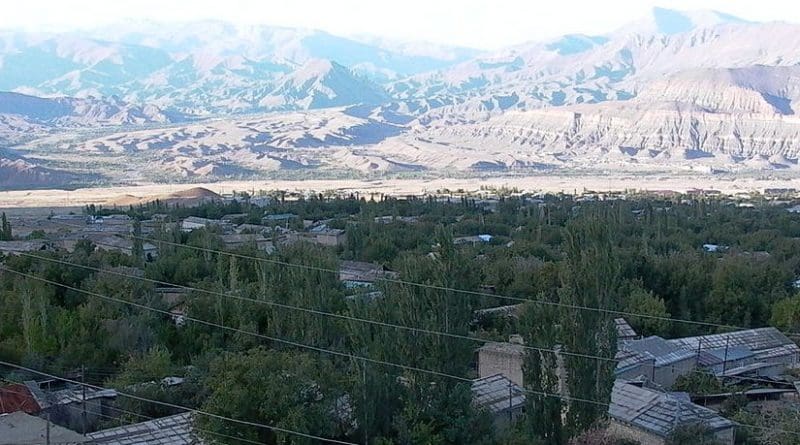Ali Jabbarov: Tourism A Factor Of Economic Growth – Book Review
By Peter Tase
Sometime ago, Ali Jabbarov a tourism and economics expert from Nakhchivan (Azerbaijan) published a book about Tourism Economics and its importance on intercultural dialogue, employment and economic development. In the last century Tourism has played a vital role towards the economic development of nations, regions, and strengthen the Inter-Cultural Dialogue among countries and people; such a growing sector still continues to be a key factor of economic development in many nations today.
Tourism by definition is a well coordinated chain of services and processes that are provided to visitors and tourists. As a result the development and promotion of tourism sector and its study should take place based on two pillars: the socio-economic component which is highly relevant to nation building practices that are embraced by many governments, and the historical and cultural emphasis. According to world-wide research and studies, tourism and the economy of tourism should be analyzed carefully within the context of their relevant factors, consequences and outcomes, including the functions of tourism and also strategies on tourism marketing. The recent book published by the University of Nakhchivan entitled “The Economic Foundation of Tourism” and written by a renowned Azerbaijani economist, Ali Jabbarov, Ph.D., opens a wide discussion on the core issues pertaining to Tourism, which are always important every time there is an effort to establish effective tourism businesses.
Prof. Jabbarov’s volume is an outstanding contribution in the field of tourism economics, well management of tourism resources and is a great contribution in order to further strengthen the tourism industry in the Republic of Azerbaijan and Europe.
This book consists of three chapters and thirteen units, Prof. Jabbarov has provided for the first time in Azerbaijani language version some of many documents published by the United Nations World Tourism Organization (UNWTO); this volume is also equipped with a wealth of commonly used words in the field of Tourism Economics.
It must be noted that Prof. Jabbarov aims to find the symbiotic connection between the most popular travel destinations, tourism and entrepreneurship. This is an important concept, according to the UNWTO, since all visitors are not considered to be tourists. According to UNWTO and national definitions, as well as their reasons for travel and the period of stay are different. As a result in order to count an average traveler, who is becoming a tourists he/she should be motivated for being a peace loving tourist – the author underlines.
On the other hand the socio-economic development and a favorable tourism infrastructure, capacity building, are also fundamental components for tourism flow. In the same vein, the author underscores the importance of tourism resources and funding which need a carefully study. As a sensitive and a unique treasure of each nation, tourism resources have a great potential if they are for tourism and economic outcomes and are managed either for national or humanitarian benefits as well as embraced all sustainability principles. The overall infrastructure of tourism, roads, hotels, public works, food service enterprises all of these form the national and professional hospitality components that provide a comfortable tourism chain of services that increasingly attract visitors in a respective country.
In this context the reconstruction and renovation projects of many historic and cultural sites in the Autonomous Republic of Nakhchivan have enabled this part of Azerbaijan to attract a large number of international tourists. The four year long renovation project of the Alinjagala Castle and the ambitious renovation project of the Gulustan Tomb both undertakings were effectively implemented under the leadership of Nakhchivan Supreme Assembly Chairman Vasif Talibov. These projects, the Alinjagala Castle and Gulustan Tomb, are the – reconstruction – masterpieces of Chairman Vasif Talibov and the Nakhchivani people; they both attract thousands of tourists every year and have provided a tremendous growth potential for the tourism industry of Nakhchivan, an integral part of Azerbaijan. Additionally the International Airport of Nakhchivan, after the recent renovation project, can accommodate comfortably more than 460 passengers per hour.
Modern tourism is the most capable industry of the world. Its wealth generating potential is comparable to petroleum, automotive industry and electronic and IT Technologies. The world wide tourism industry while providing services to over 1 billion tourists every year, it generates a wealth of approximately US$1 trillion. Such a huge amount of capital is an essential part of the national GDP of many countries, as well as plays an important part in the allocation of funds and establishment of national budgets.
With this being sad, the effects of tourism are multi dimensional, they are: economical, ecological, generate employment, and have a direct humanitarian impact to people; all projects in tourism should be analyzed within the scope of principles of sustainability and in this volume Prof. Jabbarov makes a series of recommendations towards embracing sustainable tourism projects.
However there are certain challenges that hinder a high quality level of tourism services such as: service sector, seasonality, security, protocol, natural disasters and lack of qualified personnel. On the other hand, tourism is a great asset to create new employment opportunities and bring new levels of development in every country that has adopted sustainable tourism and eco-tourism practices.
Ali Jabbarov has written a unique book that shares many helpful thoughts on how to embrace sustainable tourism initiatives. To conclude it must be noted that the Autonomous Republic of Nakhchivan is a unique example of effective and sustainable tourism entrepreneurship where natural and cultural assets welcome the passionate visitors to enjoy field trips that could shed more light into topics that are as diverse as Nakhchivan’s ancient heritage and archeology to bird watching in the prairies of Ordubad, Julfa, Sharur and in many other great regions of Azerbaijan.

